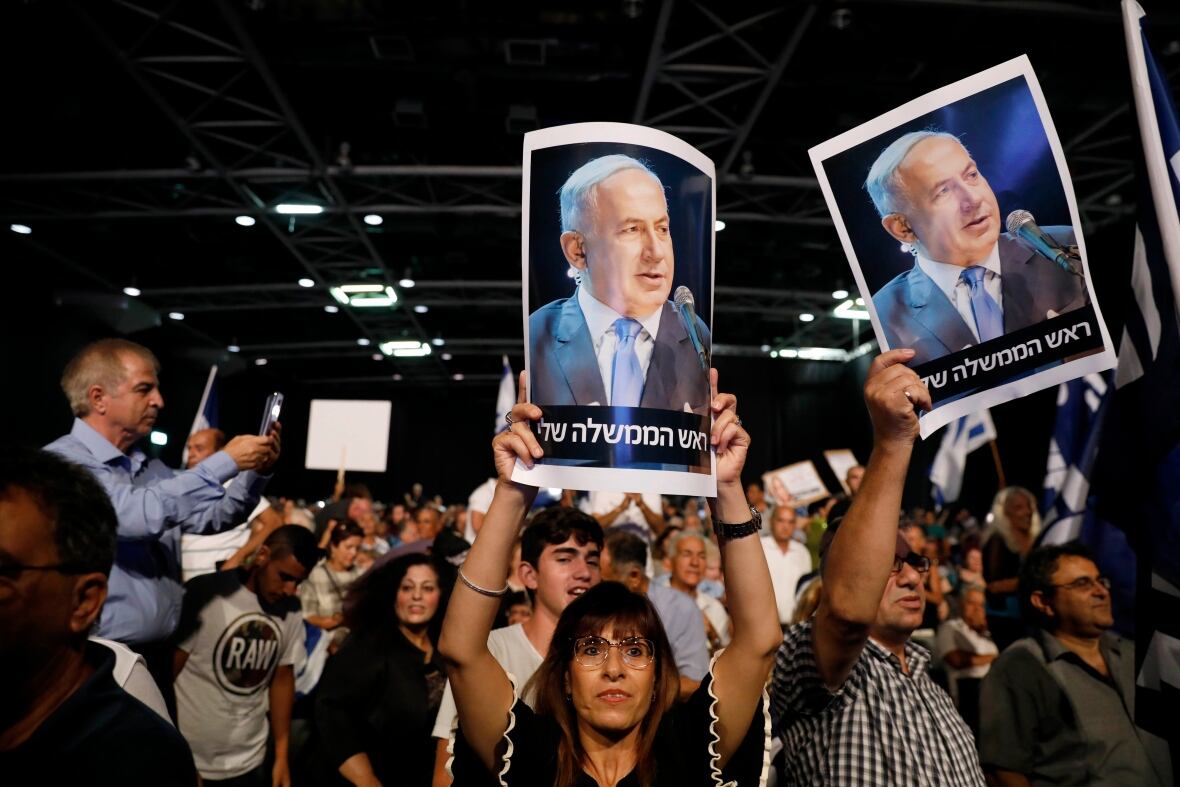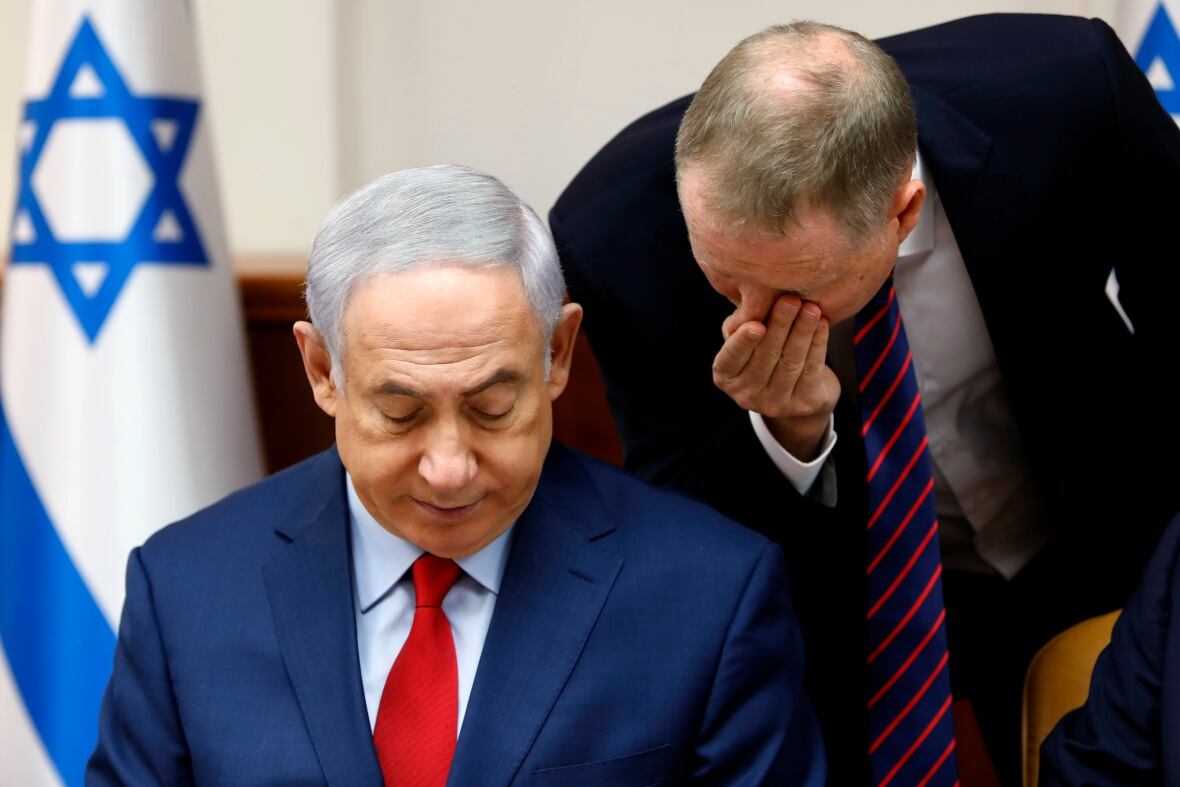'Who's next?': Police investigations have some Israelis pondering Netanyahu's future
Prime minister calls out ‘fake news’ media as allegations swirl
As Israelis flock to the beaches of the Mediterranean Sea to relax on vacation, journalists and analysts here are focused on the turbulent political waters that continue to rise, threatening to sink Prime Minister Benjamin Netanyahu's hold on power.
Israeli police are investigating Netanyahu in two separate cases involving allegations of "fraud, breach of trust and bribes," in what is the most serious crisis the prime minister, in power since 2009, has faced.
While Netanyahu has been the subject of suspicions for much of his political life, the confirmation by Israeli authorities that he is now under investigation has put the prime minister on the defensive — and has some Israelis imagining life without him running the country.
Deal struck with former chief of staff
"Netanyahu can now be seen as a dead man walking," wrote prominent Israeli columnist Sima Kadmon in the newspaper Yedioth Ahronoth.
The prospect of an indictment against Netanyahu rose earlier this month after Israeli police signed a deal with Ari Harrow, the prime minister's former chief of staff, which could see him testify against his former boss.
According to Israeli newspaper Haaretz, officials brokered a deal with Harrow on a separate and unrelated breach of trust case. Harrow would be convicted of fraud and breach of trust, but get community service and pay a fine instead of jail time.
"Netanyahu's trust in him was so high that it's clear he knows everything, especially when it comes to financial issues, and especially the big money," Kadmon wrote.
Two police investigations
The first investigation, called "Case 1000" by police, centres on allegations that Netanyahu offered favour in exchange for gifts, including champagne and cigars, from wealthy supporters, among them Hollywood producer Arnon Milchan, whose movie credits include Pretty Woman and 12 Years a Slave.
In "Case 2000," it's alleged the prime minister was engaged in backroom dealings to try to win better coverage from the publisher of Yedioth Ahronoth, which is often critical of Netanyahu.
Netanyahu has strongly denied any wrongdoing.
Prime minister fights back
Slamming the "fake news" media, he went on the offensive at a rally last week in Tel Aviv organized in support of him.

"Both the left-wing [opposition] and the media, who are one and the same… they are enlisting now in an obsessive, unprecedented hunt against me and my family, aiming to oust the government," Netanyahu said.
He's also tried to project a business-as-usual demeanour, dismissing the allegations against him as "background noise."
That hasn't deterred thousands of protestors, who have held weekly anti-Netanyahu demonstrations near the home of Israel's Attorney General in the Tel Aviv suburb of Petah Tikvah for nearly half a year.
They accuse Avichai Mandelblit of dragging his feet, and are urging him to issue an indictment against Netanyahu.
"I know this man. He changed deeply in the years from '99 until today," said protestor Motti Ashkenazi of the prime minister. "He's not the same man. He's not the same leader."
A test of Netanyahu's political strength
Netanyahu, now in his second term, is the second-longest serving prime minister of Israel, after David Ben-Gurion, a founding father of the country.
He's known around the world as a staunch defender of the Jewish state, even if his tactics sometimes raise eyebrows. Critics questioned his use of a cartoon bomb while addressing the United Nations in New York, to warn against a deal to limit Iran's nuclear program.
Still, there are few who question his abilities as a crafty political communicator. Netanyahu's latest sound bite, "there will be nothing because there is nothing," now echoes across the Israeli media.
'Long knives have already been drawn'
Any potential charges are still months away, political observers say, adding that Netanyahu is a street-smart political survivor who isn't going anywhere anytime soon.

"The long knives have already been drawn, but their time has not yet come," wrote Ma'ariv newspaper columnist Ben Caspit. "Netanyahu has no plans to give up without a fight, and in cases like this, there is no more determined fighter than him. It's not over yet."
Ehud Olmert, Netanyahu's predecessor was released from prison last month after serving about half of his 27-month sentence after being convicted of bribery, fraud, obstruction of justice and breach of trust. He was the first Israeli prime minister to be put behind bars.
'There's nobody else'
While Netanyahu has hung onto power for many years — a difficult task in Israeli politics dominated by coalition governments — analysts say he's never known overwhelming support from the public.
"I think that [Netanyahu's] staying power is not so much due to any great vision or statesmanship on his part, but more to what… voters are constantly saying: even if they're frustrated with him there's nobody else," said Dahlia Scheindlin, a political analyst and public opinion specialist.
As news of the police investigations swirled, a poll found 51 per cent of the public do not believe that Netanyahu is innocent, while only 27 per cent believe him. A larger majority — 66 per cent — believe he should resign if indicted. Israeli law does not require the prime minister to step down even if convicted.
"I think the public in general is starting to say, 'Is there somebody else coming around?'" Scheindlin told CBC News. "There's definitely the political kind of looking ahead: What's next, who's next?"